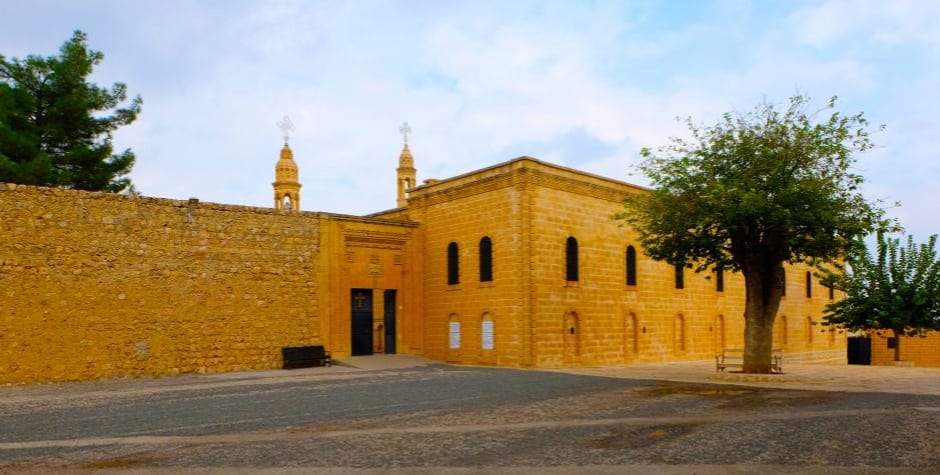

ECHR: Turkey Illegally Expropriated a Monastery Built in the 4th Century
ECHR: Mor Gabriel Monastery v. Turkey
The Mor Gabriel (Saint Gabriel) monastery is one of the oldest monasteries in the world, located in Midyat (south-eastern Anatolia), where it was built in the 4th century. It has an exceptional library of ancient manuscripts. It is managed by a Syriac Orthodox foundation. The monastery, whose domain once extended over a vast territory, has been progressively despoiled. In particular, the Turkish authorities expropriated part of a Syriac Orthodox cemetery located some 30 km from the monastery. This plot of land has been the subject of lengthy legal proceedings since 2008.
The European Court of Human Rights (ECHR) has finally ruled in favor of the monastery on October 3, 2023, in Midyat Mor Gabriel Monastery Foundation v. Türkiye (no. 13176/13). The ECHR unanimously condemned Turkey for violating the Foundation’s property rights. However, it refused to examine separately the complaints based on the right to freedom of religion, the prohibition of discrimination and the right to a fair trial.
This expropriation by Turkey is symbolic. The Syriac Orthodox community has buried its dead in this cemetery. This community was particularly affected by the Assyrian genocide, which claimed hundreds of thousands of lives between 1915 and 1918. This genocide took place in the Ottoman Empire in the same context as the Armenian genocide and that of the Pontic Greeks. These genocides are denied by the current President of the Republic of Turkey, Recep Tayyip Erdoğan.
A half-hearted victory at the ECHR
The ECHR’s ruling is yet another victory for Turkey’s Christian communities, but only a half-hearted one, since it does not order Turkey to return the cemetery plot, as the Monastery had requested, or even to pay compensation. The ECHR limited itself to “considering that the most appropriate means of remedying [this violation] would, in principle, be the holding of a new trial or a reopening of the proceedings.”[1] In other words, this condemnation of Turkey amounts in practice to condemning the Monastery to return to the endless meanders of Turkish justice, whose procrastination and unwillingness are legendary when the rights of Christians are at stake.
The ECLJ has followed this case from the outset and supports the Mor Gabriel Monastery Foundation. It will be watching closely to see whether Turkey complies with this judgment.
An old Syriac Orthodox cemetery
The Mor Gabriel Monastery Foundation had effective and uninterrupted possession of the disputed cemetery. However, this possession was never formally recognized either by a title deed or by a cadastral decision, as it predated the existence of the Turkish state and the cadastre (which remains highly imperfect). Before 1913, the Ottoman legal system prohibited non-Muslim foundations from owning property in their own name. These assets therefore had to be registered as the property of individual (lay) members of these communities. Furthermore, in 1985, an administrative act registered the cemetery in the land register as belonging to the Public Treasury. Despite a century of legal and judicial proceedings, the Syriac Orthodox Foundation has never obtained recognition of its ownership of the entire cemetery.
The ECHR focused its analysis, and its judgment, solely on the procedural aspect of the right of ownership. It found that “the Land Registry Court did not consider the purpose for which the [disputed] parcel was used (...), nor whether [the Mor Gabriel Monastery Foundation] had or had not exercised continuous possession over the property” (§59). However, “the testimonies gathered (...) indicated in particular that the four properties in question initially constituted a whole and that they were used by the applicant foundation as a cemetery for the Syriac community in the region” (§59). The ECHR made the same criticism of the other Turkish courts that had examined the case.
The ECHR found a violation of the procedural aspect of the right to property and ordered Turkey to pay €5,000 for non-pecuniary damage and €7,000 in costs and expenses to the Mor Gabriel Monastery Foundation. Above all, Turkey will also have to reopen the legal proceedings in compliance with the procedural guarantees required by the ECHR.
Systematic violation of the rights of Christians
It is regrettable that the ECHR has refused to examine the case in the light of Article 14 of the European Convention which forbids discrimination. The Mor Gabriel Monastery Foundation considered that its expropriation was discriminatory, on the basis of its Christian religion. It would have been interesting if the Court had addressed this aspect of the problem, especially as this is not the first time the ECHR has condemned Turkey for expropriating Christian communities.[2] These violations reveal that the Turkish state is pursuing a constant but unadmitted goal: to expropriate Christians.
More generally, although the Turkish constitution officially says that Turkey is a secular state, non-Muslims are in reality treated as second class citizens by the state, as a result of various kinds of discrimination. For example, the demands made on churches for the reconstruction of places of worship are discriminatory. Christians, unlike Muslims, are in general obliged to purchase at least 2,500 m2 of land to build a church and they are not allowed to have them in certain places. Churches are regularly vandalized while those responsible are seldom searched for or prosecuted.
Furthermore, the Orthodox Patriarchates are not recognized as moral persons. They are seeking a juridical recognition and their own rights in their capacity as patriarchs and not by means of the creation of foundations.[3] The fact that religious communities do not have the status of moral persons is in practice a discrimination against non-Muslim religions.
Supervising the implementation of the judgment
The previous ECHR judgment condemning Turkey for the expropriation of a Christian foundation dates back to November 2022 (Arnavutköy Greek Orthodox Taksiarhis Church Foundation v. Turkey, No. 27269/09). The ECHR had ruled in favor of a foundation of the Greek Orthodox community of Constantinople in a case in which the ECLJ was a third party. This previous judgment has not yet been followed up. The Committee of Ministers of the Council of Europe is still waiting for Turkey to send its action plan or report. Upon receipt, the Committee of Ministers will be able to fulfill its mission of supervising the implementation of this ECHR judgment. The ECLJ will assist the Committee of Ministers in this task, by intervening in the proceedings.
In the wake of the Midyat Mor Gabriel Monastery Foundation v. Türkiye judgment, the stakes are the same for ECLJ: to ensure that Turkey complies with the judgment. The Committee of Ministers currently considers 459 judgments against Turkey as non-executed or partially executed, 129 of which were ruled more than ten years ago. Turkey is the state most condemned by the ECHR, closely followed by Russia. The ruling in favor of the Mor Gabriel Monastery Foundation is to be add to the some 3,500 condemnations of Turkey since the ECHR was founded in 1959.
Contrary to what one might think, the implementation of the judgment of October 3, 2023 is not a battle lost in advance. It will, however, require patience. This is the conclusion that can be drawn from the implementation of five judgments condemning Turkey between 2007 and 2010 for violating the right of Christian foundations to respect for their property. It was only in December 2019, some ten years later, that the Committee of Ministers considered that these five judgments had been implemented. The ECLJ, which has long been involved in this subject, had intervened in 2008 as a third party in one of these cases at the ECHR: Fener Rum Erkek Lisesi Vakfi v. Turkey.
Will Turkey leave the ECHR?
The relationship between Turkey and the Council of Europe has nevertheless deteriorated since the 2010s, due to the Islamist drift of Recep Tayyip Erdoğan’s regime. Turkey has drastically reduced its contribution to the Council of Europe’s budget, contributing to its financial crisis, while building a monumental consulate there. Mr. Erdoğan, in his speech at the opening of the Turkish Parliament session on October 1, 2023, indicated his willingness to no longer “respect” ECHR decisions, or even read them.[4] Some observers consider that Turkey could soon leave the Council of Europe, and therefore also the ECHR.
__________
[1] All quotations of the judgments are a free translation from French to English.
[2] ECHR, Fener Rum Erkek Lisesi Vakfi v. Turkey, No. 34478/97, 9 April 2007; Yedikule Surp Pirgiç Ermeni Hastanesi Vakfi v. Turkey, No. 36165/02, 16 March 2009; Samatya Surp Kevork Ermeni Kilisesi v. Turkey, No. 1480/03, 16 March 2009; Bozcaada Kimisis Teodoku Rum Ortodoks Kilisesi Vakfi v. Turkey, No. 37639/03, 3 June 2009; Bozcaada Kimisis Teodoku Rum Ortodoks Kilisesi Vakfi v. Turkey n°2, No. 37646/03, 6 January 2010; Arnavutköy Greek Orthodox Taksiarhis Church Foundation v. Turkey, No. 27269/09, 15 November 2022.
[3] Department of State of the United States, “2017 Report on International Religious Freedom – Turkey”, 29 May 2018, on line
[4] https://www.economist.com/europe/2023/10/03/turkeys-president-picks-a-fight-with-the-council-of-europe












